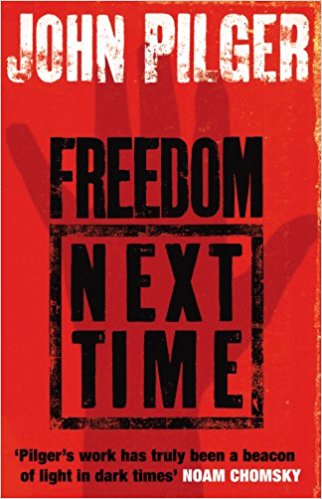 Please buy the book here. See review by Mark Curtis.
Please buy the book here. See review by Mark Curtis.
This book is about empire, its facades and the enduring struggle of people for their freedom. It offers an antidote to authorised versions of contemporary history that censor by omission and impose double standards. Chagossians, Palestinians, Afghans, South Africans and Indians are the voiceless given a voice.
The media, especially TV, has largely failed to report Britain’s forced depopulation of the Chagos islands (including Diego Garcia, now a US military base), which must count as one of the great state propaganda triumphs in recent history. “What upsets you the most?” Pilger asks Olivier Bancoult, the Chagossians’ leader in exile. “The lie that we didn’t exist,” he replies. Why, with 24-hour news coverage and hundreds of channels, have these people been invisible for so long? A secret document drawn up by British planners in 1968 was called “maintaining the fiction”, and argued (knowing it was untrue) that the islanders were not permanent inhabitants. The author, Anthony Ivall Aust, then a legal adviser to the Foreign Office, was subsequently awarded a CMG in the Queen’s birthday honours. The story is a good indication of mainstream British political culture – buried in the mainstream media, the perpetrators of crimes against foreign unpeople shower honours on themselves while the US is appeased.
Yet “maintaining the fiction” also nicely describes Whitehall’s current stance in the Middle East, where the official story is that Britain is an “honest broker” between Israel and Palestine. The reality is that Britain has provided more than £70m in military equipment to Israel in the past five years, acts as Israel’s chief defender in the EU by resisting calls to rescind preferential trade arrangements and virtually never even calls for an end to the occupation of Palestinian territory. Pilger writes that Britain, and France, gave Israel a “green light” to attack the West Bank in 2001, having been shown a secret plan for an all-out reoccupation. He also counters the “absurd claim” – widely reported – that Israel’s former prime minister Ehud Barak previously offered to give up 90% of the West Bank.
Shining India serves as a welcome antidote to the barrage of news items and documentaries painting a picture of a society on the up. While there is a developing middling class arising from the managerial layer of the multinationals that have re-located there, the fact remains that for the vast bulk of the almost one billion population life has become a lot harder.
What about the “authorised version” of reality in South Africa since the end of apartheid? When Nelson Mandela stepped out of prison in 1990, the elation in South Africa and around the world was palpable. But true freedom for his people remains a distant dream. Pilger notes that while average household income has risen by 15%, average black household income has fallen by 19%. The World Bank in effect imposed a traditional “structural adjustment programme” after apartheid, but with the complicity of the African National Congress (ANC) government. Although the ANC certainly has its achievements, it has failed to reclaim sufficient land for the dispossessed and presides over a growing gap between rich and poor. “The unspoken deal,” Pilger writes, “was that whites would retain economic control in exchange for black majority rule.” Thus secret meetings were held in Britain before 1994 between the current president, Thabo Mbeki, members of the Afrikaner elite and companies with big commercial stakes in the country. Mandela told Pilger: “We do not want to challenge big business that can take fright and take away their money. You can call it Thatcherite but, for this country, privatisation is the fundamental policy.”
In Afghanistan, Pilger seeks out the voices of ordinary Afghanis who have survived atrocities at the hands of the Taliban, the US sponsored Northern Alliance and the US military itself. He moves from Afghanistan to the Pentagon to interview some leading lights in the Bush administration, giving these people rope to hang themselves with during interviews.
Yes Edinburgh West has a website, Facebook, Twitter, National Yes Registry and a Library of topics on Scottish Politics, including Foreign Affairs.
